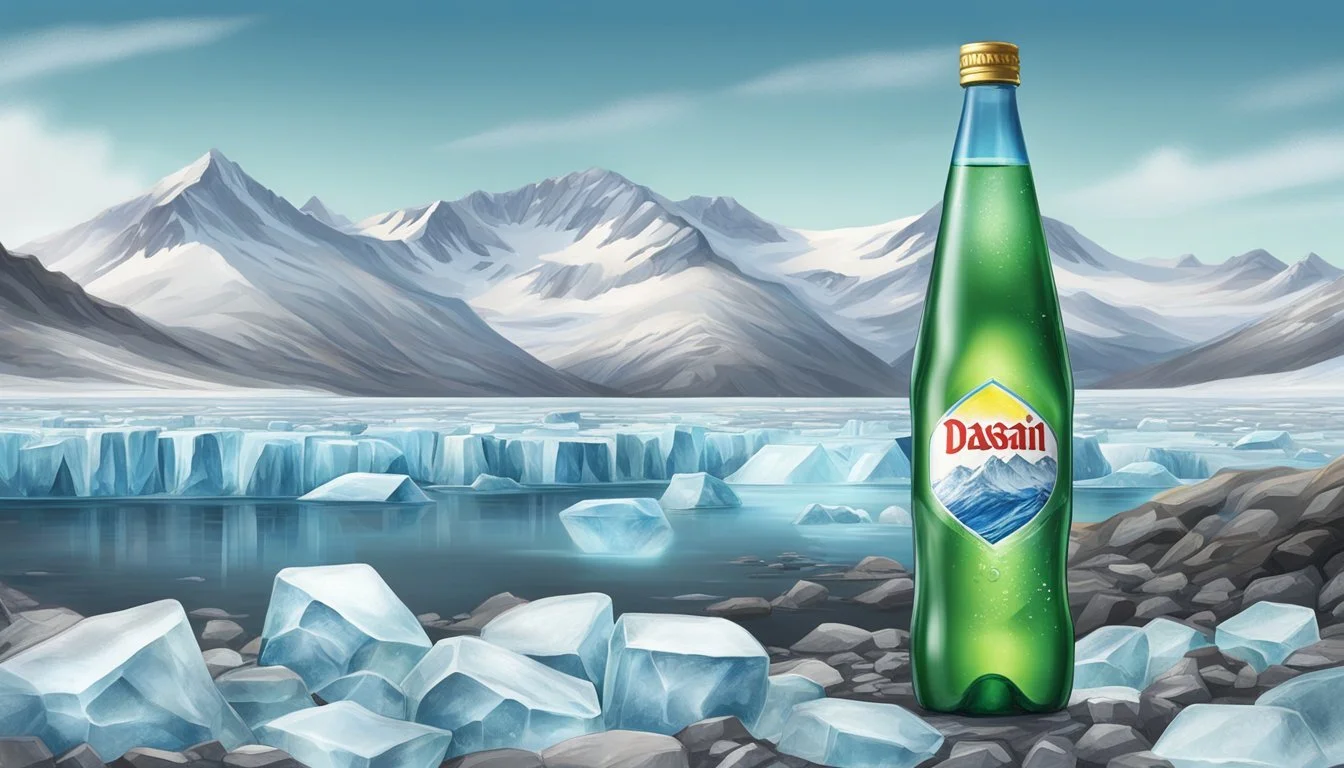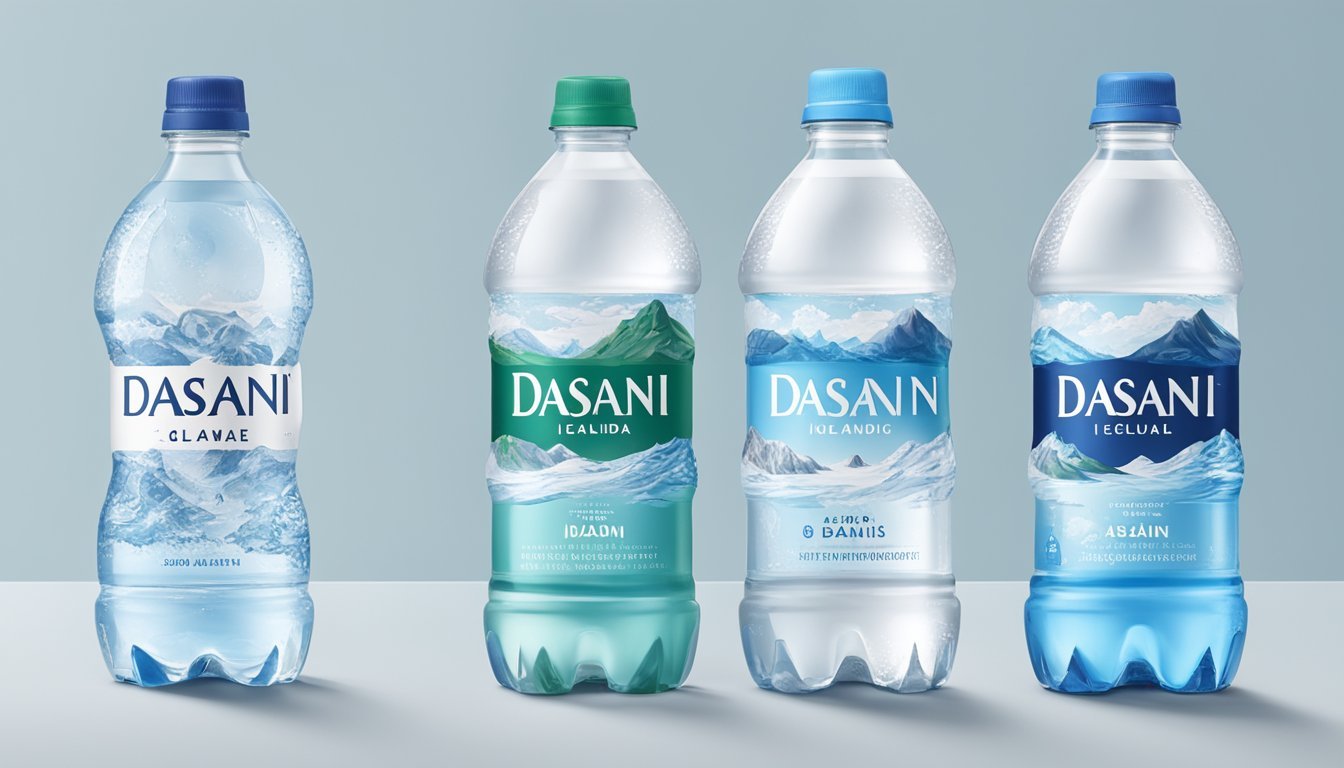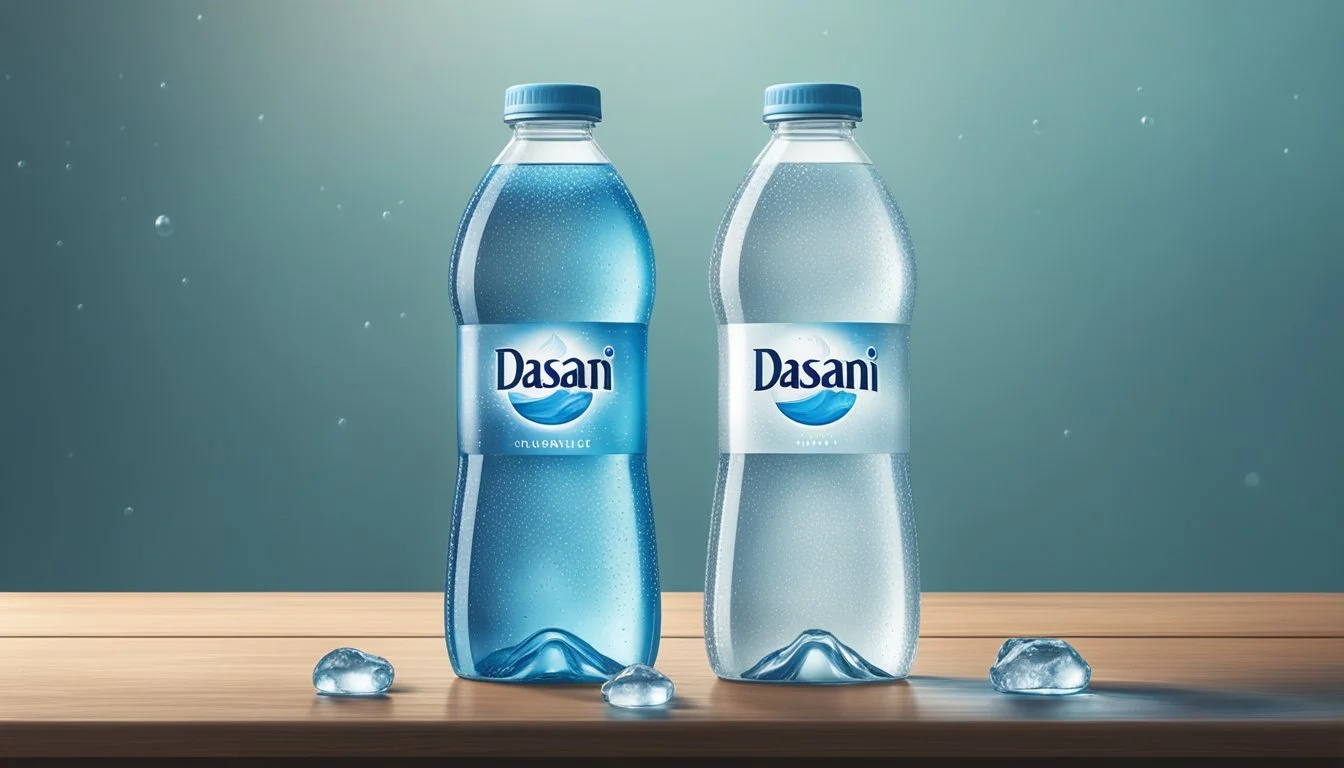Icelandic Glacial vs. Dasani
Comparing Purity and Taste
When it comes to choosing the best bottled water, consumers often find themselves deciding between popular brands like Icelandic Glacial and Dasani. Icelandic Glacial, known for its purity and rich mineral content, offers a refreshing taste that many find superior. On the other hand, Dasani, with its wide availability and consistency, remains a staple in hydration for many.
Icelandic Glacial water is sourced directly from the legendary Ölfus Spring in Iceland, promising naturally low mineral content and remarkable purity. This positions it as a premium choice among bottled waters, appealing to those who prioritize taste and natural sourcing. With a reputation bolstered by numerous positive reviews, Icelandic Glacial often stands out in the competitive bottled water market.
Dasani, produced by The Coca-Cola Company, is widely recognized for its accessibility and affordability. Enhanced with minerals for a crisp taste, it meets the everyday hydration needs of a broad consumer base. While it may not have the elite status of Icelandic Glacial, its consistency and availability make it a reliable option for many.
Understanding Bottled Water
Bottled water comes in various forms, each offering unique qualities and adhering to specific standards to ensure safety and quality. Additionally, the environmental impact of bottled water, particularly bottle waste, is a growing concern that consumers should consider.
Types of Bottled Water
Spring Water: Sourced from underground formations, it flows naturally to the surface and must be collected only at the spring or through a borehole.
Mineral Water: Contains minerals and trace elements naturally present at the source. It cannot undergo any treatment that alters its original composition.
Purified Water: Typically derived from tap or groundwater, this water undergoes processes like distillation, deionization, or reverse osmosis to remove impurities and contaminants.
These types vary based on origin, treatment processes, and mineral content, affecting both taste and health benefits.
Regulatory Standards and Safety
The EPA regulates tap water, while the FDA oversees bottled water, ensuring both meet stringent safety standards. Bottled waters must comply with labeling requirements that specify their source and any treatments used.
Regulations mandate regular testing for contaminants like bacteria, heavy metals, and chemicals. Standards for bottled water are typically as strict, if not stricter, than those for tap water.
Bottled water must also follow Good Manufacturing Practices (GMPs) to ensure safe and hygienic production, packaging, and storage processes.
Environmental Impact of Bottles
Bottled water production and disposal have significant environmental repercussions. The use of plastic bottles contributes to plastic waste, a major sustainability issue. Plastic waste often ends up in landfills or oceans, harming wildlife and ecosystems.
Some companies use recycled or biodegradable materials to mitigate environmental impact. Emphasis is placed on reducing plastic use, increasing recycling efforts, and promoting refillable options.
Sustainable practices, such as sourcing water responsibly and minimizing carbon footprints in production and transportation, are crucial. Consumers are encouraged to opt for brands prioritizing environmental friendliness and supporting initiatives to combat plastic pollution.
Profile of Icelandic Glacial
Icelandic Glacial is a premium bottled water sourced from Iceland's Ölfus Spring. It boasts a high pH and alkaline nature, with a commitment to sustainability and purity.
Source and Purity
Icelandic Glacial is sourced from the legendary Ölfus Spring in Iceland. This spring, formed over 5,000 years ago from volcanic activity, is one of the world's largest natural springs.
Purity is a defining feature, as the water is naturally filtered through layers of volcanic rock. This ensures a clean and pristine water source, free from pollutants. Only 0.1% of the spring’s runoff is bottled, preserving the spring's natural state.
Mineral Composition
The mineral composition of Icelandic Glacial makes it unique.
It has a naturally occurring pH level of 8.4, making it alkaline. Unlike many other bottled waters, it does not rely on additives for its alkaline properties. The slow filtration through volcanic rock imparts essential minerals such as calcium, magnesium, and sodium, contributing to its crisp and refreshing taste.
Brand Philosophy and Sustainability
Icelandic Glacial emphasizes a strong commitment to sustainability. The brand claims to be the world's first CarbonNeutral® certified bottled water producer, offsetting its carbon emissions throughout the entire production process.
Water is bottled at a state-of-the-art facility where environmentally friendly practices are prioritized. Additionally, the natural replenishment of the Ölfus Spring by rainfall and snowmelt ensures long-term sustainability of the water source.
Profile of Dasani
Dasani, a product of the Coca-Cola Company, is widely known for its purified water that goes through a rigorous filtration process. This section covers the unique filtration technique, the specific ingredients added to enhance taste, and Coca-Cola’s strategic brand placement of Dasani in the market.
Filtration Process
Dasani water undergoes a thorough filtration process designed to remove impurities. The purification steps include reverse osmosis, which eliminates contaminants and minerals that might affect taste.
After the initial filtration, Dasani employs microfiltration and ozonation. Microfiltration removes fine particulates, while ozonation, a chemical-free method, disinfects the water. This method ensures that the water remains clean and safe for consumption.
Added Ingredients
To enhance the taste, Dasani adds a blend of minerals to its purified water. These minerals include magnesium sulfate, potassium chloride, and a trace of salt.
The added ingredients not only improve taste but also contribute to the body’s electrolyte balance. These enhancements set Dasani apart, giving it a clean, crisp flavor favored by many consumers.
Coca-Cola's Brand Position
Coca-Cola’s marketing strategy positions Dasani as a premium choice in the bottled water market. The brand emphasizes sustainability by using 100% recyclable bottles, enhancing its appeal to environmentally-conscious consumers.
Additionally, Coca-Cola leverages its vast distribution network to ensure Dasani’s availability across the globe. The extensive reach and strategic placement make it one of the most recognized bottled water brands worldwide.
Nutritional Comparison
Both Icelandic Glacial and Dasani offer unique nutritional profiles, focusing on different aspects of water quality and mineral content, which are crucial for hydration and overall health.
Mineral and Electrolyte Content
Icelandic Glacial water is renowned for its natural purity, containing a balance of important minerals.
It is sourced from Iceland's pristine environment, which contributes to its mineral richness. Specific minerals found in Icelandic Glacial include calcium, magnesium, and sodium. These minerals help in maintaining electrolyte balance and promoting healthy bodily functions.
Dasani, on the other hand, is purified and enhanced with a blend of minerals. The added minerals—mostly magnesium sulfate, potassium chloride, and salt—aim to improve taste and provide basic electrolytes. Dasani does not naturally contain these minerals but adds them to achieve a specific flavor profile and slight health benefits.
pH Levels and Alkalinity
Icelandic Glacial boasts a naturally occurring alkaline pH level of around 8.4.
This higher pH level can help neutralize acidity in the body and maintain pH balance. Alkaline water is often sought after for these potential health benefits and its smooth taste.
Dasani has a pH level that ranges from 5.6 to 7.2. This neutral to slightly acidic pH results from its rigorous purification process and the addition of specific minerals.
While it may not offer the same alkaline benefits as Icelandic Glacial, Dasani provides a balanced hydration option with a clean taste.
Both bottled water options cater to different nutritional needs and preferences, focusing on either natural mineral content or enhanced purity and flavor.
Taste and Packaging
In comparing Icelandic Glacial and Dasani, it's vital to examine their flavor profiles and the design of their bottles. Both elements significantly impact the consumer experience.
Flavor Profile and Aftertaste
Icelandic Glacial boasts a naturally alkaline water sourced from ancient lava rock. This unique filtration process gives it a distinct, crisp taste with a subtle, clean aftertaste. Dasani, produced by Coca-Cola, has a more consistent flavor due to its purification process, which includes reverse osmosis and the addition of minerals for taste. While Icelandic Glacial may come across as more sophisticated, some consumers feel Dasani offers a more refreshing experience.
Bottle Design and Materials
Icelandic Glacial uses sleek, clear bottles that emphasize purity and elegance. Their packaging is often made from high-quality, recyclable materials designed to reduce environmental impact. On the other hand, Dasani utilizes PET plastic bottles, which are lightweight and practical. Though both brands aim for sustainability, Icelandic Glacial's glass options and aesthetic appeal cater to those seeking a premium experience.
In essence, both brands have unique qualities that cater to different preferences, whether focusing on a clean, crisp taste or practical, environmentally-conscious packaging.
Consumer Perception and Demand
Consumers of bottled water often prioritize purity, taste, and brand reputation. Demand fluctuates based on these key factors, influencing market trends and customer preferences.
Market Trends
The bottled water market shows a notable shift toward premium brands. Icelandic Glacial is gaining traction due to its claimed purity and unique source. Consumers are increasingly drawn to water sourced from pristine environments, like Icelandic springs.
Dasani holds a significant market share, largely due to its wide availability and aggressive marketing strategies. The brand's use of added minerals to enhance flavor appeals to health-conscious consumers seeking both hydration and mineral supplementation. Recent trends indicate a growing preference for brands that emphasize sustainability and ethical sourcing, areas where Icelandic Glacial positions itself strongly.
Customer Reviews and Preferences
Customer reviews highlight key differences in preferences for Dasani and Icelandic Glacial. Icelandic Glacial is praised for its clean, crisp taste and low mineral content, making it a popular choice for those seeking purity in their water.
Dasani receives mixed reviews; some appreciate the added minerals for taste and health benefits, while others criticize the use of artificial ingredients. On platforms like Amazon, Icelandic Glacial often receives higher ratings, reflecting consumer loyalty and satisfaction. Dasani's widespread availability, however, ensures it remains a convenient and frequently chosen option for many consumers.
The competition between these brands highlights diverse consumer needs and preferences, shaping the landscape of bottled water choices.
Health and Hydration
Icelandic Glacial and Dasani both provide hydration, but their health benefits and concerns need careful consideration. This includes examining hydration benefits and potential pollution concerns from plastic use.
Benefits of Proper Hydration
Staying hydrated is crucial for overall health. Icelandic Glacial water is known for its exceptional purity and beneficial mineral content, offering reliable hydration. Proper hydration helps maintain bodily functions such as temperature regulation, joint lubrication, and nutrient transport.
Proper hydration prevents dehydration, aiding cognitive function and physical performance. Dasani provides accessible hydration but includes added minerals for taste. The added minerals might appeal to some, though for those who prioritize natural sources, this alteration could be a downside.
Concerns with Bottled Water
Plastic pollution is a significant issue tied to bottled water consumption. Bottles from both Dasani and Icelandic Glacial contribute to environmental waste if not recycled properly. The presence of plastic particles in bottled water is another concern, impacting long-term health.
Icelandic Glacial positions itself as more environmentally conscious with sustainable practices. Nonetheless, the mere production and disposal of plastic bottles still pose environmental concerns. Dasani is widely available, making it convenient, yet its accessibility doesn’t mitigate the environmental footprint each bottle leaves behind.
Both brands must address pollution and sustainability more aggressively to satisfy health-conscious and environmentally aware consumers.
Economic and Ecological Considerations
When comparing Icelandic Glacial and Dasani bottled water, it's essential to evaluate the cost and environmental impact. Pricing and the ecological responsibility of the companies play significant roles in determining which brand is the superior choice.
Cost-Effectiveness for Consumers
Dasani, a product of The Coca-Cola Company, is often sold at a lower price point across various retail stores. This affordability makes it an attractive option for budget-conscious consumers. With wide availability, Dasani is a convenient choice for many households.
Icelandic Glacial, on the other hand, is generally priced higher. This reflects its premium branding and imported status. Consumers paying a premium enjoy naturally sourced water with high purity. The higher price may not appeal to all, but it caters to those seeking high-quality hydration.
Environmental Responsibility of Companies
Icelandic Glacial positions itself as an eco-friendly brand. It uses 100% recyclable packaging and has a certified carbon-neutral process. This commitment to reducing the carbon footprint attracts environmentally conscious customers. Their sustainability efforts include renewable energy and minimal water waste.
Dasani has also taken steps towards environmental responsibility. The brand has introduced PlantBottle® packaging, made partially from plants and fully recyclable. Nonetheless, it faces criticism for its plastic use and carbon emissions. Dasani continues to work on improving its environmental policies to match consumer expectations for greener practices.
The Future of Bottled Water
The future of bottled water revolves around innovation in packaging and filtration as well as a shift towards sustainable practices. Companies are advancing technologies to enhance water quality and reduce environmental impact.
Innovation in Packaging and Filtration
Bottled water companies are investing in improved packaging options. Biodegradable bottles and eco-friendly materials are becoming more common to combat plastic waste. Some brands are experimenting with recyclable aluminum bottles and plant-based plastics.
In filtration, advanced methods like reverse osmosis and carbon filtration ensure cleaner, purer water. Nano-filtration technology is evolving to remove even smaller impurities, and some brands incorporate mineral enhancement to improve taste.
The Shift Towards Sustainable Practices
Sustainability is a focal point for bottled water companies. Brands are reducing their carbon footprint by using renewable energy sources and optimizing logistic networks. Refillable bottle stations are emerging as a practical solution for consumers to reduce waste.
Water sourcing practices are also under scrutiny. Companies aim to balance local ecosystem health with their extraction activities. Sustainability certifications and transparent reporting on environmental impact are becoming standard.
More About Icelandic Glacial
Acqua Panna vs Icelandic Glacial: Which Bottled Water is Better?
Aquafina vs Icelandic Glacial: Which Bottled Water is Better?
Arrowhead vs Icelandic Glacial: Which Bottled Water is Better?
Boxed Water vs Icelandic Glacial: Which Bottled Water is Better?
Core Hydration vs Icelandic Glacial: Which Bottled Water is Better?
Deer Park vs Icelandic Glacial: Which Bottled Water is Better?
Essentia vs Icelandic Glacial: Which Bottled Water is Better?
Eternal vs Icelandic Glacial: Which Bottled Water is Better?
Ice Mountain vs Icelandic Glacial: Which Bottled Water is Better?
Icelandic Glacial vs 1907water: Which Bottled Water is Better?
Icelandic Glacial vs 7-Select: Which Bottled Water is Better?
Icelandic Glacial vs Alkaline88: Which Bottled Water is Better?
Icelandic Glacial vs Antipodes: Which Bottled Water is Better?
Icelandic Glacial vs Aqua Carpatica: Which Bottled Water is Better?
Icelandic Glacial vs Big Chill: Which Bottled Water is Better?
Icelandic Glacial vs Big Win: Which Bottled Water is Better?
Icelandic Glacial vs BodyArmor: Which Bottled Water is Better?
Icelandic Glacial vs Cascade Mountain: Which Bottled Water is Better?
Icelandic Glacial vs Castle Rock: Which Bottled Water is Better?
Icelandic Glacial vs CBD Living: Which Bottled Water is Better?
Icelandic Glacial vs Crystal Geyser: Which Bottled Water is Better?
Icelandic Glacial vs Crystal Lake: Which Bottled Water is Better?
Icelandic Glacial vs Erewhon: Which Bottled Water is Better?
Icelandic Glacial vs Essence pH10: Which Bottled Water is Better?
Icelandic Glacial vs Hawaii Volcanic: Which Bottled Water is Better?
Icelandic Glacial vs Hawaiian Springs: Which Bottled Water is Better?
Icelandic Glacial vs Just Water: Which Bottled Water is Better?
Icelandic Glacial vs Kirkland Signature: Which Bottled Water is Better?
Icelandic Glacial vs LIFEWTR: Which Bottled Water is Better?
Icelandic Glacial vs Liquid Death: Which Bottled Water is Better?
Icelandic Glacial vs Mananalu: Which Bottled Water is Better?
Icelandic Glacial vs Mountain Valley Spring Water: Which Bottled Water is Better?
Icelandic Glacial vs Nestle Pure Life: Which Bottled Water is Better?
Icelandic Glacial vs Open Water: Which Bottled Water is Better?
Icelandic Glacial vs Perrier: Which Bottled Water is Better?
Icelandic Glacial vs Poland Spring: Which Bottled Water is Better?
Icelandic Glacial vs Proud Source: Which Bottled Water is Better?
Icelandic Glacial vs Pure Life: Which Bottled Water is Better?
Icelandic Glacial vs Purely Sedona: Which Bottled Water is Better?
Icelandic Glacial vs Refreshe: Which Bottled Water is Better?
Icelandic Glacial vs Richard's Rainwater: Which Bottled Water is Better?
Icelandic Glacial vs San Pellegrino: Which Bottled Water is Better?
Icelandic Glacial vs Simple Truth: Which Bottled Water is Better?
Icelandic Glacial vs Smartwater: Which Bottled Water is Better?
Icelandic Glacial vs Solan de Cabras: Which Bottled Water is Better?
Icelandic Glacial vs Starkey: Which Bottled Water is Better?
Icelandic Glacial vs Talking Rain AQA: Which Bottled Water is Better?
Icelandic Glacial vs The Well: Which Bottled Water is Better?
Icelandic Glacial vs Topo Chico: Which Bottled Water is Better?
Icelandic Glacial vs Tru Alka: Which Bottled Water is Better?
Icelandic Glacial vs Waiakea: Which Bottled Water is Better?
Icelandic Glacial vs Weird Water: Which Bottled Water is Better?
Icelandic Glacial vs Whole Foods 365: Which Bottled Water is Better?
Icelandic Glacial vs Whole Foods Italian Still Mineral water: Which Bottled Water is Better?
Icelandic Glacial vs Zephyrhills: Which Bottled Water is Better?
Icelandic Glacial vs HFactor: Which Bottled Water is Better?








